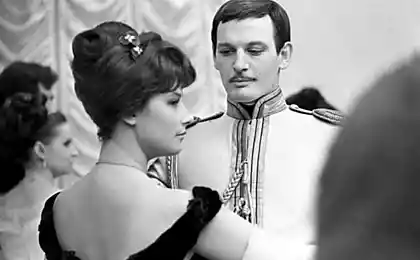415
"Yes and No" weigh the same
The words "Yes" and "No" weigh the same
"To give you a ride to the bus station?" asked Heidi, an old Swiss lady, a friend of our family. I was going to the city with its villas, to walk to the bus stop 3-4 kilometers and then still do not know how long to wait for the bus, and from bus station there are a lot of transport in the city, and the walk I don't really like.
I wanted to say, "Yes, Yes, please," but in this case, Heidi will have to change from summer pants, open the gate, drive the car out of the garden, spend time and take me. And it makes me terribly uncomfortable, so I start to mumble something like: "no, don't, I'll walk I guess." Heidi feels the contradiction between what I say and what I want, and, slightly irritated, asked again: "So, maybe, after all, need a ride?"
Again I refuse, trying to be polite, say they do not want to bother.
And then Heidi teaches me a lesson which helps me for 10 years.

"You know, we in Switzerland say "Yes" and "no" to weigh the same. If I offer you a ride, I still will tell you "Yes" or "no". I'm prepared for any answer, I don't mind riding with you to the bus station, just as easy to stay home. But you think like one of the options I prefer the other one, and choose it, although it is not what is convenient for you. In Russia it often does. But I want you to understand if I didn't want you to go, I wouldn't have offered. If they give you a choice, one your answer is equivalent to another. You want a ride?"
And I said "Yes!" plain and simple. Because I was much more convenient and faster to get to the bus station by car. And I was grateful to Heidi for what she gave me, and even more for teaching me this simple rule.
"Yes and no" weigh the same that I repeat inside myself, every time I think that my answer is not like him.
"Yes and no" weigh the same — it's about the fact that we are all equal and free.
"Yes and no" weigh the same — not superficial etiquette, and a clean, sincere relationship.
"Yes and no" weigh the same — and it is not necessary to hope that the other will guess what you really want.
When you allow yourself to be straightforward, give this freedom to others.
To all of my questions or offer I'm willing to hear both positive and negative. But if one of the answers is preferable for me, I will let my interlocutor and will formulate differently.
For example, instead of neutral-polite "Go away?", depending on what I want to say, "Come on in, I'll be glad with you to drink tea and chat!" (assuming that our desires may not be the same) or "I would have invited you to visit, but today am tired and I want to be alone".
I remember how my relationship with my girlfriend has reached a new level of intimacy. She said
— You will take part in the organization of our festival?
— Honestly, no, I do not see this. Don't want to organize anything. I replied, internally in preparation for subsequent resistance to persuasion.
— Oh, you know, how nice — asked — received the answer — go ahead.
Know. It is the power of certainty.
Harder when the person is not accustomed to that "Yes" and "no" to weigh the same. Then instead of a simple monosyllabic answer to every "will you Come with us?" and "can I help you?" begins the story and how hard it's gonna be a day, how many just need the time and will try to please everyone, everywhere and all the time, not to disappoint. I'm usually sad to hear that.
And it begins in childhood. We learn to guess what answer you want to hear, instead listen to yourself. We used to find that to the questions: "do You like kindergarten?" and "Want soup?" —there is only one desired response for our grandmother. We learn that the rejection of a boring gift or uninteresting trip to the Museum, you see, will upset our distant relatives. We learn that we should be polite and go meet the others. We learn that the questions we ask just out of habit and out of courtesy, and to real our responses no one cares.

Well, we grew up and can no longer play this shit. And to teach this lie to their children.
Each of us has a right to ask for and gratefully accept gifts, suggestions, help and love others, as well as the right to refuse, to disagree, to close and defend its borders without the guilt.
"Yes" and "no" to weigh the same, do you agree? (and by asking this question this way, I mean that any of your responses to me interesting equivalent!) published
Author: Anna Black
P. S. And remember, just changing your mind - together we change the world! ©
Source: annachernykh.ru/da-i-net-vesyat-odinakovo/
"To give you a ride to the bus station?" asked Heidi, an old Swiss lady, a friend of our family. I was going to the city with its villas, to walk to the bus stop 3-4 kilometers and then still do not know how long to wait for the bus, and from bus station there are a lot of transport in the city, and the walk I don't really like.
I wanted to say, "Yes, Yes, please," but in this case, Heidi will have to change from summer pants, open the gate, drive the car out of the garden, spend time and take me. And it makes me terribly uncomfortable, so I start to mumble something like: "no, don't, I'll walk I guess." Heidi feels the contradiction between what I say and what I want, and, slightly irritated, asked again: "So, maybe, after all, need a ride?"
Again I refuse, trying to be polite, say they do not want to bother.
And then Heidi teaches me a lesson which helps me for 10 years.

"You know, we in Switzerland say "Yes" and "no" to weigh the same. If I offer you a ride, I still will tell you "Yes" or "no". I'm prepared for any answer, I don't mind riding with you to the bus station, just as easy to stay home. But you think like one of the options I prefer the other one, and choose it, although it is not what is convenient for you. In Russia it often does. But I want you to understand if I didn't want you to go, I wouldn't have offered. If they give you a choice, one your answer is equivalent to another. You want a ride?"
And I said "Yes!" plain and simple. Because I was much more convenient and faster to get to the bus station by car. And I was grateful to Heidi for what she gave me, and even more for teaching me this simple rule.
"Yes and no" weigh the same that I repeat inside myself, every time I think that my answer is not like him.
"Yes and no" weigh the same — it's about the fact that we are all equal and free.
"Yes and no" weigh the same — not superficial etiquette, and a clean, sincere relationship.
"Yes and no" weigh the same — and it is not necessary to hope that the other will guess what you really want.
When you allow yourself to be straightforward, give this freedom to others.
To all of my questions or offer I'm willing to hear both positive and negative. But if one of the answers is preferable for me, I will let my interlocutor and will formulate differently.
For example, instead of neutral-polite "Go away?", depending on what I want to say, "Come on in, I'll be glad with you to drink tea and chat!" (assuming that our desires may not be the same) or "I would have invited you to visit, but today am tired and I want to be alone".
I remember how my relationship with my girlfriend has reached a new level of intimacy. She said
— You will take part in the organization of our festival?
— Honestly, no, I do not see this. Don't want to organize anything. I replied, internally in preparation for subsequent resistance to persuasion.
— Oh, you know, how nice — asked — received the answer — go ahead.
Know. It is the power of certainty.
Harder when the person is not accustomed to that "Yes" and "no" to weigh the same. Then instead of a simple monosyllabic answer to every "will you Come with us?" and "can I help you?" begins the story and how hard it's gonna be a day, how many just need the time and will try to please everyone, everywhere and all the time, not to disappoint. I'm usually sad to hear that.
And it begins in childhood. We learn to guess what answer you want to hear, instead listen to yourself. We used to find that to the questions: "do You like kindergarten?" and "Want soup?" —there is only one desired response for our grandmother. We learn that the rejection of a boring gift or uninteresting trip to the Museum, you see, will upset our distant relatives. We learn that we should be polite and go meet the others. We learn that the questions we ask just out of habit and out of courtesy, and to real our responses no one cares.

Well, we grew up and can no longer play this shit. And to teach this lie to their children.
Each of us has a right to ask for and gratefully accept gifts, suggestions, help and love others, as well as the right to refuse, to disagree, to close and defend its borders without the guilt.
"Yes" and "no" to weigh the same, do you agree? (and by asking this question this way, I mean that any of your responses to me interesting equivalent!) published
Author: Anna Black
P. S. And remember, just changing your mind - together we change the world! ©
Source: annachernykh.ru/da-i-net-vesyat-odinakovo/
4 ways to raise unhealthy relationship to food from a baby
Tiny house from the tube for a comfortable stay in the nature























